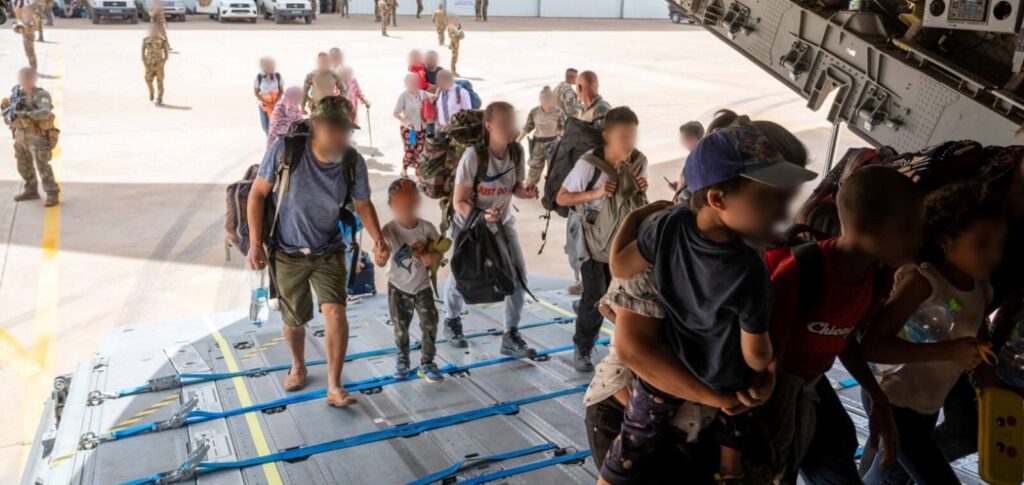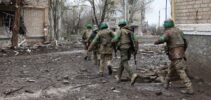After 10 days of intense shooting, international powers managed to negotiate with both sides the withdrawal of diplomatic employees and citizens of other nationalities from the country, causing a foreign exodus.
ADVERTISING
“We took advantage of a small window of opportunity,” said a British government spokesperson. “With intense fighting in Khartoum and the closure of the main airport” since April 15, the day the clashes began, a larger withdrawal was “impossible,” the source added.
More than 1.000 European Union (EU) citizens were evacuated from the country. Spain announced the departure of 100 people, including Spaniards and Latin Americans. The United States government removed employees from the diplomatic service, at least 100 people, in helicopters.
China – Sudan's trading partner – withdrew a first contingent of citizens from the African country, just as several Arab countries announced the departure of hundreds of people.
ADVERTISING
A Lebanese man who traveled by bus told AFP that he managed to get out with just “a shirt and pajamas”. “It was all that was left after 17 years in Sudan,” he laments. In Khartoum, “we were in a state of siege,” he says.
State of siege
The capital's more than five million inhabitants have not had water or electricity service for several days. And food is also in short supply. The United Nations calls for an immediate ceasefire so that humanitarian entities can reach civilians trapped in the middle of the war.
Guterres urged “all Council members to exert maximum pressure on the parties to end the violence, restore order and return to the path of democratic transition”, under threat of the conflict spreading to other neighboring regions.
ADVERTISING
Understand what happens in Sudan
Violence in the northeast African country of 45 million inhabitants exploded on April 15 between the army of General Abdel Fatah al-Burhan – who took power in 2021 after a coup d’état – and his great rival, General Mohamed Hamdan Daglo, leader of the paramilitaries that make up the Rapid Support Forces (FAR).
Burhan and Daglo together overthrew the dictator Omar al Bashir, after the large protests against the three decades of dictatorship that ended in 2019.
There was a wave of public protests and a massacre with around 100 dead in Khartoum. With international pressure, the military that took power promethey had a transitional government made up of civilians and members of the armed forces.
ADVERTISING
This transitional government was supported by the international community. However, it was unable to move forward, because the two groups never understood each other.
In 2021 the council that governed the country was dissolved, and a new military dictatorship was established there.
And what happens now?
Daglo considered that the coup was a “mistake” because it failed to generate change, keeping remnants of the former Bashir regime in high positions.
ADVERTISING
The two sides exchange accusations about attacks on prisons to free hundreds of inmates, as well as robberies of houses and factories.
The bloodiest conflict exploded when, recently, the current government attempted to integrate the FAR into the official Army, a fundamental requirement for the reestablishment of democracy in Sudan.
And who is in charge?
After days of clashes, it is difficult to know who controls which parts of the capital. Satellite images show the extent of the damage, visible from inside the army's General Staff headquarters.
“No party seems to be winning at the moment and, taking into account the intensity of the fighting, things could get worse before the two generals sit down at the negotiating table”, warns Clément Deshayes, from Paris 1 University.
Without foreigners, the Sudanese are left to fend for themselves.
“As foreigners flee, the impact of violence on an already critical humanitarian situation in Sudan is worsened,” warned the UN. Amid the crossfire, United Nations agencies and other humanitarian organizations suspended their activities in the country.
Five aid workers – four of them from the UN – have died and, according to the doctors' union, almost 75% of hospitals are out of service.
The five million inhabitants of Khartoum have only one thought: to abandon the city, a scene of chaos.
(With information from the UN and AFP)
Read also
Receive news and newsletters do Curto News by Telegram e WhatsApp.




